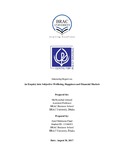An inquiry into subjective well being, happiness and financial markets

View/
Date
2017-08-30Publisher
BARC UniversityAuthor
Fuad, Syed MuhtasimMetadata
Show full item recordAbstract
This internship report has been submitted in partial fulfillment of the requirements for a Bachelors of Business Administration and was prepared during my internship at the Centre for Policy Dialogue.
The report is divided into two parts. The first part is the organizational section, which covers the organizational overview and my responsibilities during my internship. The second part is the independent project. For this section, I chose to study a certain aspect of the Easterlin Paradox, which suggests that there is no link between a society’s economic development and its average level of wellbeing. Using a cross-country dataset covering 64 countries over a decade, I try to establish a link between average levels of subjective wellbeing and stock market performance. The results show that countries that score high on the wellbeing index tend to have high capitalization stock markets (demonstrated by higher capitalization to GDP ratio and more listings per million populations) and turnover ratios. In particular, the growth in market capitalization was related to confidence in national government, democracy index and freedom to make life choices. It was also found that countries with lower Gini coefficient (i.e. more equitable distribution of wealth) and lower levels of corruption tended to perform better in the stock market performance indicators. The results indicate a clear and positive relationship between overall stock market performance and wellbeing.
